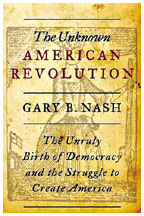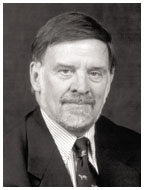October 5, 2005: Reading Room
Historian Gary Nash ’55 *64 examines the revolution from its messy, populist roots. (courtesy UCLA) |
An
unruly birth
Gary Nash ’55 *64 retells the story of the American Revolution
By Justin Nyberg ’01
For historian Gary B. Nash ’55 *64, the American Revolution most people know is full of holes.
Missing are the stories of the common people — the poor settlers and shipbuilders, Christian revivalists and abolitionists, the blacks, women, and Native Americans whose ideas, ambitions, and blood were as important in forging the United States as any of the Founding Fathers.
In The Unknown American Revolution: The Unruly Birth of Democracy and the Struggle to Create America, published by Viking in June, the latest of his more than a dozen books, Nash examines the revolution from its messy, populist roots. And it looks almost nothing like what the one-time Pulitzer Prize finalist was taught as an undergraduate and graduate student in history at Princeton.
 The
real American Revolution, Nash argues, was far broader — and far
less virtuous — than is acknowledged in popular culture. Far from
being a unified struggle to cast off British oppression, it was a hodge-podge
of divergent, often opposing revolutions — as much a civil and cultural
war as a revolution, but one that was whitewashed into a neat and self-congratulatory
narrative through the prejudices of early historians. Nash’s volume
is, if not the antidote, both a companion and populist rebuttal to the
codified textbook version.
The
real American Revolution, Nash argues, was far broader — and far
less virtuous — than is acknowledged in popular culture. Far from
being a unified struggle to cast off British oppression, it was a hodge-podge
of divergent, often opposing revolutions — as much a civil and cultural
war as a revolution, but one that was whitewashed into a neat and self-congratulatory
narrative through the prejudices of early historians. Nash’s volume
is, if not the antidote, both a companion and populist rebuttal to the
codified textbook version.
The book focuses on “ordinary people ... who did most of the fighting, dying, and most of the dreaming about a different America, and have tended to be lost in this flood of Founding Father biographies,” says Nash, a professor at the University of California, Los Angeles.
It is often overlooked, he points out, that black slaves were struggling for independence as fervently as their colonial keepers — through sporadic uprisings and even on the battlefield — only to see their American revolution squelched with the signing of a Constitution that sanctioned slavery.
Nash also examines the birth of a rebellious populism among poor farmers and squatters as they fought against oppressive land policies of the ruling elite, while giving equal play to the doomed attempt of Native Americans to protect their hunting grounds from the encroachment of settlers.
Nash has focused almost his entire career on studying America’s early days, especially concentrating on issues of race and class in the colonies. He joined UCLA in 1966 and has directed the university’s National Center for History in the Schools since 1994.
Nash’s latest book has drawn criticism from conservatives and
some fellow historians, one of whom called The Unknown American Revolution
a “neo-progressive” revision of history “overloaded
with modern multicultural politics.” But at a time when American
revolutions are being exported around the world — from Iraq to Afghanistan
— with tumultuous results, it bears keeping in mind, Nash says,
that our own democracy’s birth was far messier and more painful
than we might care to remember. ![]()
Justin Nyberg ’01 is a writer for Outside magazine in Santa Fe, N.M.
BOOK SHORTS
 The Boys in the Brownstone — KEVIN SCOTT ’73 (Haworth).
This humorous novel follows a group of gay friends who regularly get together
at a “gentleman’s bar” on Manhattan’s Upper East
Side. The book avoids stereotypes and instead portrays an eclectic assortment
of gay men — some out, some not — with family, financial,
and career issues. Scott teaches screenwriting at New York University.
The Boys in the Brownstone — KEVIN SCOTT ’73 (Haworth).
This humorous novel follows a group of gay friends who regularly get together
at a “gentleman’s bar” on Manhattan’s Upper East
Side. The book avoids stereotypes and instead portrays an eclectic assortment
of gay men — some out, some not — with family, financial,
and career issues. Scott teaches screenwriting at New York University.
 Twilight — KATHERINE MOSBY ’79 (HarperCollins). Mosby’s
new novel, set in Paris on the verge of World War II, explores an American
woman’s sexual and political awakening. The main character, Lavinia
Gibbs, breaks off her engagement and sails to Europe. In Paris, she rebuilds
her life and falls in love with the charming, long-married Gaston Lesseur.
Mosby is an adjunct professor at New York University’s Stern School
of Business.
Twilight — KATHERINE MOSBY ’79 (HarperCollins). Mosby’s
new novel, set in Paris on the verge of World War II, explores an American
woman’s sexual and political awakening. The main character, Lavinia
Gibbs, breaks off her engagement and sails to Europe. In Paris, she rebuilds
her life and falls in love with the charming, long-married Gaston Lesseur.
Mosby is an adjunct professor at New York University’s Stern School
of Business.
 Lost Triumph: Lee’s Real Plan at Gettysburg — And
Why It Failed — Tom Carhart *98, foreword by James M. McPherson
(Putnam). Historian Tom Carhart offers a revisionist view of Confederate
Gen. Robert E. Lee’s failure at Gettysburg, considered a pivotal
moment of the Civil War. Carhart describes what he believes was Lee’s
real plan for battle. Carhart is an adjunct professor of history at the
University of Mary Washington in Fredericksburg, Va. McPherson is an emeritus
professor at Princeton.
Lost Triumph: Lee’s Real Plan at Gettysburg — And
Why It Failed — Tom Carhart *98, foreword by James M. McPherson
(Putnam). Historian Tom Carhart offers a revisionist view of Confederate
Gen. Robert E. Lee’s failure at Gettysburg, considered a pivotal
moment of the Civil War. Carhart describes what he believes was Lee’s
real plan for battle. Carhart is an adjunct professor of history at the
University of Mary Washington in Fredericksburg, Va. McPherson is an emeritus
professor at Princeton. ![]()
By K.F.G.
For a complete list of books received, click here.

